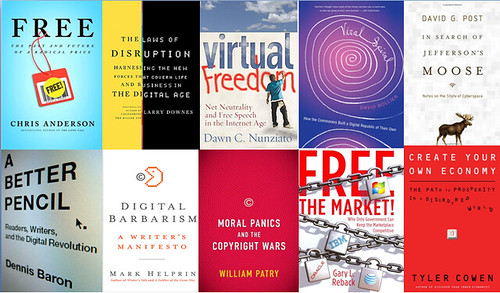
En diciembre del año pasado reprodujimos un extracto de una entrada de Adam Thierer en The Techonology Liberation Front (Los mejores libros del 2008 [1]). Convertido en un clásico de Blawyer repetimos la selección que Thierer hace para este año (The 10 Most Important Info-Tech Policy Books of 2009 [2]). Lamentablemente sólo he podido encontrar uno de ellos en línea y otro traducido al español. Reproducimos la lista:
(1) Chris Anderson – Free: The Future of a Radical Price. [crónica del artículo base: En el mundo del todo es gratis, Microsoft ¿Un pionero? [3]].
(2) Larry Downes – The Laws of Disruption: Chaos and Control in Your Virtual Future.
(3) Dawn C. Nunziato – Virtual Freedom: Net Neutrality and Free Speech in the Internet Age.
(4) David Bollier – Viral Spiral: How the Commoners Built a Digital Republic of Their Own.
(5) David Post – In Search of Jefferson’s Moose: Notes on the State of Cyberspace.
(6) Dennis Baron – A Better Pencil: Readers, Writers, and the Digital Revolution.
(7) Mark Helprin – Digital Barbarism: A Writer’s Manifesto.
(8) William Patry – Moral Panics and the Copyright Wars.
(9) Gary Reback – Free the Market! Why Only Government Can Keep the Marketplace Competitive.
(10) Tyler Cowen – Create Your Own Economy: The Path to Prosperity in a Disordered World y John Freeman – The Tyranny of E-Mail: The Four-Thousand-Year Journey to Your Inbox.
Mención destacada: Manuel Castells – Communication Power (Comunicación y poder, Alianza Editorial, Madrid: 2009 [4]); James Boyle – The Public Domain: Enclosing the Commons of the Mind (disponible en línea [5]) [nuestra crónica: El movimiento de cercamiento y el dominio público [6]]; Randall Stross – Planet Google: One Company’s Audacious Plan to Organize Everything We Know; Ken Auletta – Googled: The End of the World As We Know It; Scott Rosenberg- Say Everything: How Blogging Began, What It’s Becoming, and Why It Matters; John W. Dozier Jr. and Sue Scheff – Google Bomb.